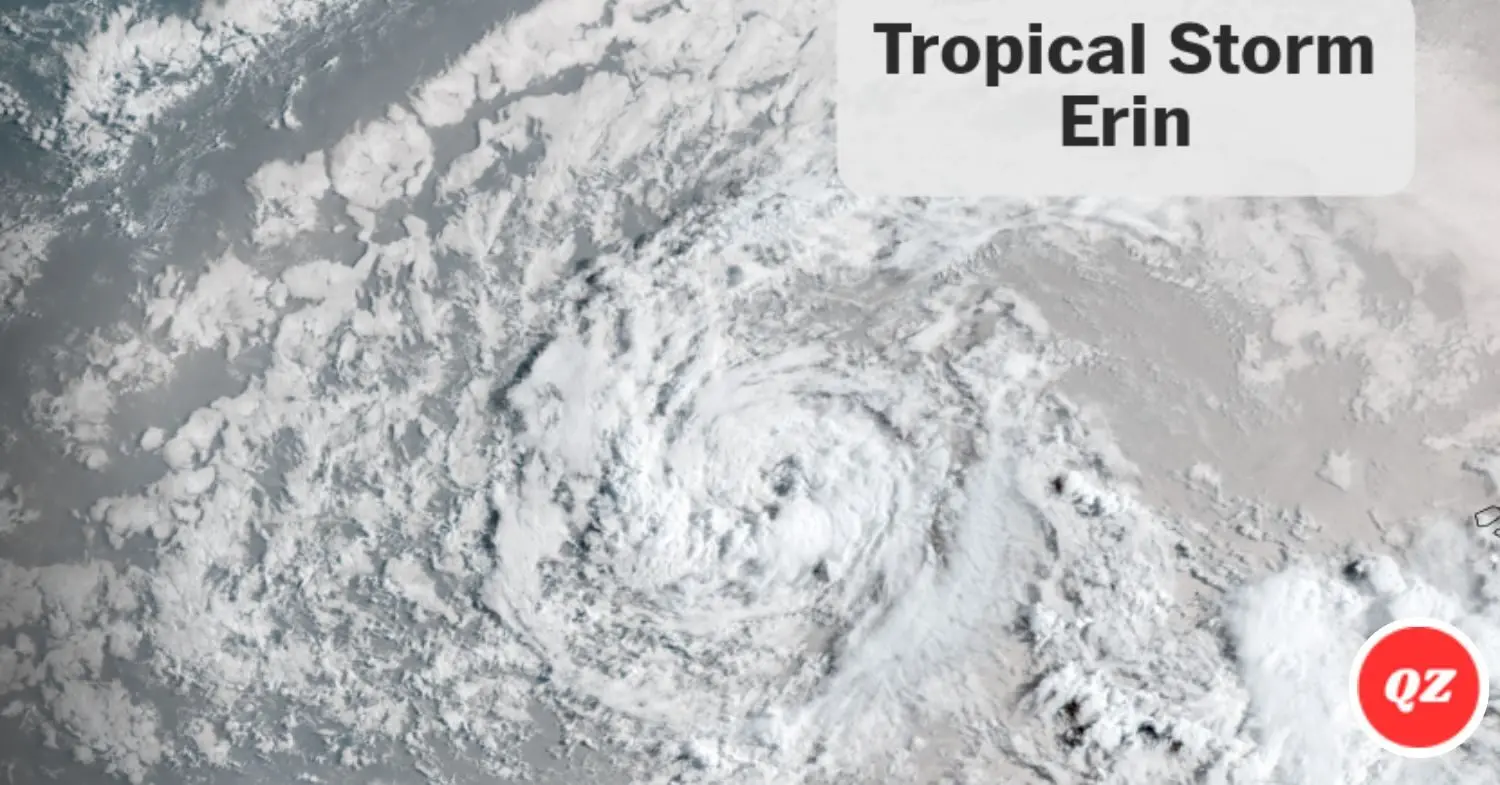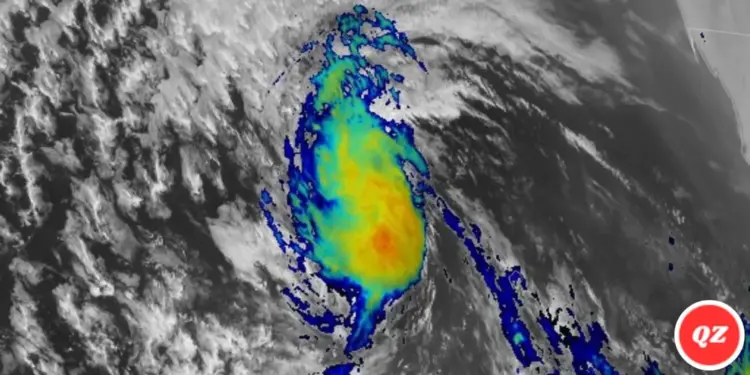Tropical Storm Erin has officially formed in the Atlantic Ocean, marking a significant milestone as the fifth named storm of the 2025 Atlantic hurricane season. The National Hurricane Center says Tropical Storm Erin has formed just west of the Cabo Verde Islands, and forecasters predict this system will become the season’s first hurricane within days.
Tropical Storm Erin Formation: Latest Updates from National Hurricane Center

Tropical Storm Erin formed in the eastern Atlantic Ocean on Monday, becoming the fifth named storm of the Atlantic hurricane season. The National Hurricane Center issued its first advisory for the storm at 200 PM CVT on Monday, August 11, 2025, confirming that the tropical disturbance had organized into a named storm.
Current Storm Statistics and Intensity
Live tracking map, satellite images and forecasts of Tropical Storm Erin 2025 west of the Cabo Verde Islands. Current wind speed 45mph. Max 115mph. The storm’s formation represents the typical August awakening that meteorologists expect during peak hurricane season, with conditions becoming increasingly favorable for tropical development.
Hurricane Erin Path: Spaghetti Models Show Potential US Impact
Tropical Storm Erin spaghetti models reveal a complex forecast scenario as meteorologists track multiple potential paths for the developing storm. Erin has formed in the eastern Atlantic and is forecast to be the first hurricane and first major hurricane of the 2025 Atlantic season. Erin will be a long-track storm and will eye the United States next week.
Understanding the Forecast Models
Tropical Storm Erin, still far in the east-central Atlantic, is forecast to intensify into a major Category 3 hurricane by this weekend, but a big turn to the north is still expected before the U.S. coast. The spaghetti models show various scenarios, with most indicating a northward turn that could spare the US East Coast from direct impact.
Tropical Storm Erin Track: What Meteorologists Are Watching
Erin will head toward warmer waters in the coming days, allowing it to strengthen into a hurricane. The Weather Channel and other forecasting services are monitoring several key factors that will determine Erin’s ultimate path and intensity.
Critical Factors Affecting Storm Development
The storm’s track will be influenced by high-pressure systems, steering currents, and sea surface temperatures. Erin is predicted to hit Category 3 strength by this weekend, making it potentially the first major hurricane of the 2025 Atlantic season.
NOAA Hurricane Center Monitoring: Official Forecasts and Warnings
The NOAA Hurricane Center continues providing regular updates on Tropical Storm Erin’s progress, with forecasters emphasizing the storm’s potential for rapid intensification. The center’s advanced satellite technology and computer models provide crucial data for tracking the storm’s development.
Hurricane Season Peak Activity Arrives
The typical August awakening of hurricane season has arrived. Here is what you need to know about these areas that could see tropical development in the next week or so. August through October represents the most active period of Atlantic hurricane season, with peak activity typically occurring in early September.
Tropical Storm Erin Hurricane Forecast: Intensity Predictions
Erin could become not only the first hurricane of the season but also its first major hurricane. Meteorologists are closely monitoring environmental conditions that could allow for rapid intensification as the storm moves over increasingly warm Atlantic waters.
Long-Term Forecast Challenges
Tropical Storm Erin formed in the central Atlantic Ocean on Monday morning and is forecast to become the first major hurricane of the 2025 Atlantic hurricane season after causing at least seven deaths in the Cabo Verde islands off the coast of Africa. The storm’s early formation near the Cabo Verde Islands follows a classic pattern for potentially significant Atlantic hurricanes.
Atlantic Hurricanes Pattern: Historical Context for Erin
Storm Erin represents the type of Cape Verde-type hurricane that often becomes the season’s most significant systems. These storms form off the African coast and have the potential for long-range development across the Atlantic Ocean.
Seasonal Implications and Preparedness
The formation of Tropical Storm Erin signals that the 2025 Atlantic hurricane season is entering its most active phase. Residents along the US East Coast should use this time to review hurricane preparedness plans, even as current forecasts suggest the storm may turn north before impacting the coastline.
Tracking Technology: Modern Hurricane Forecasting
Advanced spaghetti models and satellite technology provide forecasters with unprecedented detail about tropical systems like Erin. These tools help meteorologists analyze multiple scenarios and provide more accurate long-range forecasts than ever before.
The Role of Hurricane Hunters and Satellite Data
The National Hurricane Center utilizes hurricane hunter aircraft, satellite imagery, and sophisticated computer models to track storms like Tropical Storm Erin. This multi-layered approach provides the detailed analysis necessary for accurate forecasting and timely warnings.
Current Weather Conditions: What’s Driving Erin’s Development
Sea surface temperatures, wind shear patterns, and atmospheric moisture levels all contribute to Tropical Storm Erin’s potential for strengthening. Current conditions across the Atlantic basin remain favorable for tropical development, suggesting additional storms may follow.
Environmental Factors Supporting Storm Growth
The absence of strong wind shear and the presence of warm ocean waters create ideal conditions for Hurricane Erin formation. These environmental factors will be crucial in determining whether the storm reaches its predicted Category 3 intensity.
Preparedness and Safety: What Residents Should Know
While current Tropical Storm Erin path forecasts suggest a turn north before US impact, coastal residents should remain vigilant and prepared. Hurricane season preparedness includes having emergency supplies, evacuation plans, and staying informed through official weather sources.
Official Information Sources
The National Hurricane Center, NOAA Hurricane Center, and local National Weather Service offices provide the most reliable and up-to-date information about Tropical Storm Erin and other Atlantic hurricanes. Social media and unofficial sources should not be used for critical safety decisions.
Stay informed about Tropical Storm Erin and all 2025 Atlantic hurricane season developments. Visit QuizzyZone for comprehensive weather tracking, hurricane preparedness guides, and the latest updates on how Tropical Storm Erin and other Atlantic storms are developing throughout this active hurricane season.
Tropical Storm Erin represents the beginning of peak hurricane season activity, reminding coastal communities of the importance of staying prepared and informed throughout the Atlantic hurricane season that continues through November 30th.
Continue following official National Hurricane Center updates and local emergency management guidance for the most current information about Tropical Storm Erin and hurricane safety.

























